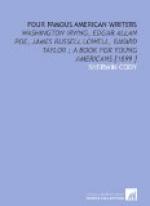CHAPTER VII
HOSEA BIGLOW, YANKEE HUMORIST
In December, 1844, Lowell felt that his income from his literary work, though very small and precarious, was sufficient to justify him in marrying, and accordingly he was united to Miss White. She was delicate in health, and after their marriage the couple went to Philadelphia, where they spent the winter in lodgings. Lowell became a regular contributor to the Freeman, an antislavery paper once edited by Whittier. From this he derived a very small but steady income; and the next year he was engaged to write every week for the Anti-Slavery Standard on a yearly salary of five hundred dollars. This connection he maintained for the next four years.
In June, 1846, the editor of the Boston Courier, a weekly paper well known in the “Hub” for its literary character even to this day, received a strange communication. It was a letter signed “Ezekiel Biglow,” enclosing a poem written by his son Hosea. This is the way the letter began:
Jaylem, June, 1846.
Mister Eddyter:—Our Hosea wuz down to Boston last week, and he see a cruetin Sarjunt a struttin round as popler as a hen with 1 chicking, with 2 fellers a drummin and fifin arter him like all nater, the sarjunt he thout Hosea hedn’t gut his i teeth cut cos he looked a kindo’s though he ’d jest cum down, so he cal’lated to hook him in, but Hosy woodn’t take none o his sarse for all he hed much as 20 Rooster’s tales stuck onto his hat and eenamost enuf brass a bobbin up and down on his shoulders and figureed onto his coat and trousis, let alone wut nater hed sot in his featers, to make a 6 pounder out on.
The letter was rather a long one, and closed thus. Referring to the verses enclosed, the writer says:—
If you print em I wish you’d jest let folks know who hosy’s father is, cos my ant Kesiah used to say it’s nater to be curus ses she, she aint livin though and he’s a likely kind o lad.
Ezekiel Biglow.
The poem itself began with this stanza:
Thrash away, you’ll hev to
rattle
On them kittle-drums o’
yourn,—
‘Taint a knowin’ kind o’
cattle
Thet is ketched with mouldy
corn;
Put in stiff, you fifer feller,
Let folks see how spry you
be,—
Guess you’ll toot till you are yeller
‘Fore you git ahold
o’ me!
The letter and the poem were printed together in the Courier, and immediately were the talk of the town. You will remember that in 1846 the war with Mexico was just beginning, and many people were opposed to it as the work of “jingo” politicians, controlled in some degree by the slavery power. Southern slaveholders wished to increase the territory of the United States in such a way as to enlarge the territory where slavery would be lawful. The antislavery people of New England were violently opposed to the war, and this poem by the Yankee Hosea Biglow immediately became popular, because it put in a humorous, common-sense way what everybody else had been saying with deadly earnest.




